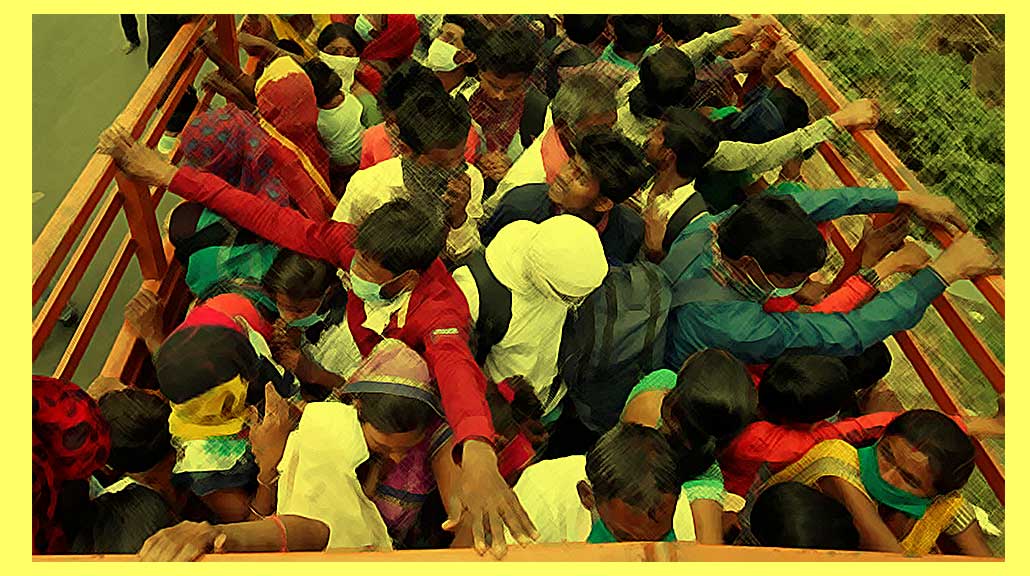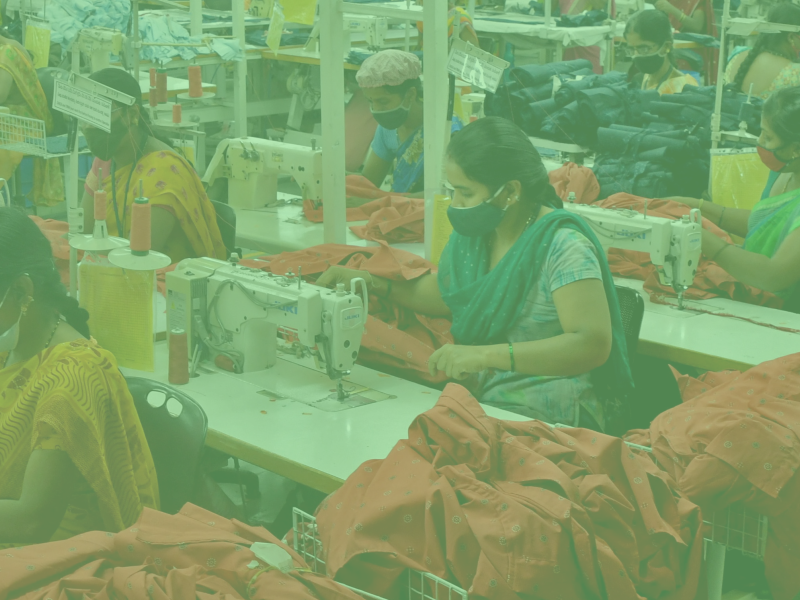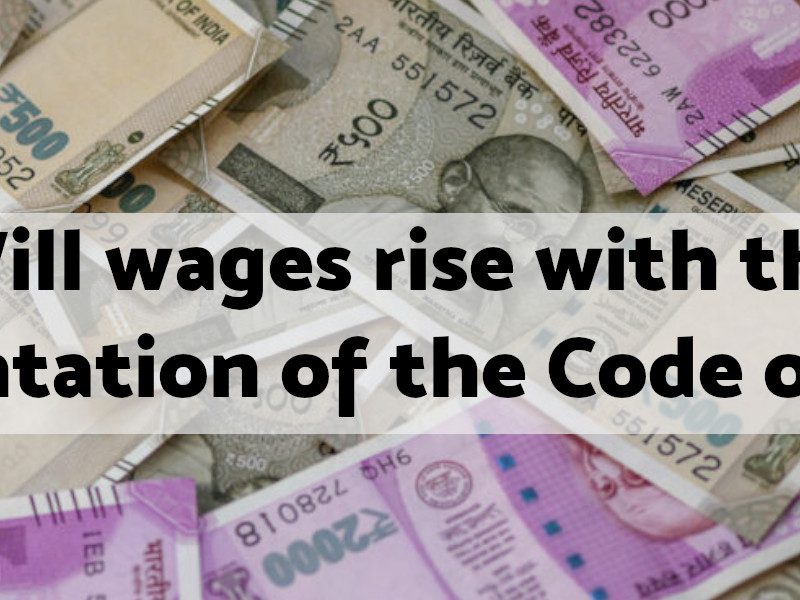The pandemic that we are living through and those of us who have lost their near and dear ones has brought us all face to face with a grim side of reality. Every year more people die in our country from simple curable diseases like tuberculosis or even from non-disease like child birth. That does not create a pandemic, neither does it alarm the world. This global lockdown is a first in the history of humankind – this is of course a product of globalisation. As the privileged strutted across the globe, they carried the virus with them and generously distributed it to the not so privileged people around them. No one stopped them from globe-trotting till the lockdown was declared. Only those showing symptoms of the fever were quarantined, the others were allowed to go and spread the virus to the community. We also waited for a certain state government to get formed to announce the national lockdown. There was no prior information, no prior experience of people of how a lockdown would look like, and of course two and a half month down the line, we still do not know how long this lockdown will last. No one got a chance to prepare for the lockdown. The lockdown was also declared at the end of a month when most people scrape through waiting for the next pay check. This pay check has now become more elusive than ever for the largest section of workers across the country.
The ministry of home affairs issued a notification dated 29 March 2020 directing all employers to pay full wages without deduction within due date to all categories of workers. The same ministry has now issued a notification on 17 May 2020 stating that all earlier directives will stand cancelled from 18 May onwards, which effectively means, employers, lockdown or not, are no longer bound to pay wages to workers beyond 18 May. This came a day after the Supreme Court heard several petitions filed by employers and their associations claiming they do not have the capacity to pay wages for the period of the lockdown while the government sought more time to respond. In the meanwhile the finance minister has announced several rounds of financial package to reduce the distress of ‘people’. Except the additional allocation for the MNREGA there is nothing in it that can be accessed by the working people of this country without getting further weighed down, this time under debt. India has more than 40 million migrant workers. If all of them seek work under the MNREGA, the additional allocation of budget will only provide for 45 days of work as opposed to the 100 days. This of course is an extreme situation but not as extreme as it reads since rural workers across the country has been for several months raising the issue of non-payment of their wages. A significant part of the additional allocation will possibly have to be spent to clear those dues which will leave a smaller available fund for new projects.
Let us for a minute forget these complex issues of policy and financing and imagine the story of this worker:

She worked as a construction worker in Mumbai. When the lockdown was announced, the project where she worked had to shut down. She lived in a shanty at the project site with a few others from her village. There was no food, no way to go home. She tried to take a train one day but the police attacked and drove them away. She borrowed some money from her contractor to get food but even he refused after sometime claiming he didn’t get paid. At this point she decided to brave it out – she along with those from her village in Uttar Pradesh decided to walk home. With her 5 year old girl in hand she started walking in the simmering heat. She was one of the lucky ones who reached her village – exhausted but alive. She didn’t get run over by a truck or a train or the heat and lack of food and water. She waited eagerly to hear what the government would announce in their package for workers and to her dismay she realised that now she will have to start petitioning at the panchayat for work under the MNREGA. The ordeal for her is not over. To get what the government claims has been allocated for her, she will have to perform heavy manual labour in the months of burning summer ahead. This is all the government that she had voted for had to offer her after these months of acute distress.
Is this Life or Death?
Gone are the days when we could belive that agents of god on earth would take care of us – they closed their shops as soon as the pandemic hit us. They were replaced by humans – doctors, nurses, paramedics, humans we also often ignored – safai workers, ASHA and anganwadi workers, delivery workers, security guards and many more. They have been keeping us going. Miraculous cures to covid have not been heard of since the lockdown. Miracles are dead.

Gone are also the days when we could believe that our employers are benevolent. They will take care of us if we remain loyal to them, not go against their will, and we will rise along the ranks if we work harder every day. Gone are also the days when our contractors told us that they will take care of us in times of need as we are all from the same caste, or same religion, or same village, or same state. They who make profit at the cost of our labour are refusing to pay us even our wages for the months of the lockdown while sharing photos of themselves in their luxurious homes on social media and contributing to the PMCare fund. They are simultaneously petitioning the government to not let us go home so they can start their establishments all over again after the lockdown. The contractors have either abandoned us or are threatening us on behalf of the employers. Gone are our fraternal bond that gave us hope and bound us in loyalty.
And most importantly, gone are the days when we could believe that the government that we elected will take care of us in time of need. We don’t have enough food to feed our family, we don’t have access to healthcare, many of us continue to work without any protection, even for government, we don’t have transport to take us home, many of us are walking hundreds of km to get home, there are no shelters for us, there is no help for us. The police harasses us for breaking the lockdown, sprays disinfectants on us as if we are pests, takes us back to the cities to face hunger all over again.
Will the workers who are running away from cities, come back?
Many experts are saying that migrants who are going back to their villages will not come back to the cities in a hurry. Uncertainty and joblessness in the cities will keep them away. This may be true for a small minority of workers who may have some sustenance at home – which basically means – who own enough land to feed on for some time. But those without land will surely have to come back and possibly come back sooner than they thought themselves. Workers who are getting impoverished in this pandemic, pushed to destitution, pushed even to near death will again come back to the cities to seek work.
Rural distress is far more complex than urban distress. In rural India if you have no land, you are competing with your own to get farm work or other rural non-farm work with very low wages packaged with generations of caste, religious, gender discrimination. In cities workers are able to find some work or the other to ensure they stay alive. The jobs may be insecure, the jobs may be unsafe, the jobs may be irregular and low waged, but they are better than staying in the village. So migrant workers despite what they have faced and will face, they will come back to the cities. But will they be the same people who will come back? Will they trust their new employers and contractors? Will they trust the system? Or will they question everything?

The fundamental flaw with theories of capitalism is that it treats labour as just another input in the process of production – just like land or capital. It refuses to accept its own principle that every individual is a ‘rational’ being with an ability to make choices unlike land or machines. This ability is irrespective of their level of education, or their skill, or their gender, or their caste or religion. Workers are human – with emotions, with ability to think and most importantly, with memory. Workers coming back to work after the pandemic will not be the same ever again. They would come back with the memory of distress, the memory of helplessness, with the memory of betrayal, and also with the memory of solidarity of fellow workers, of volunteers who selflessly supported them, provided them with food and water, provided shelter. These were people who proved the fundamental basis of capitalism to be wrong. Rationality of individuals is not self seeking – rationality lies in solidarity. Those of us who will survive this crisis, will do so because our fellow working people stood by us while we stood by them.
Will the pandemic create a wave of New Unionism?
Historically trade unions have always been formed and have grown in a crisis. It is only in the severest condition do we realise that we need each other to survive. But this alone is not enough to push forward towards collective action.
The Inevitable
While I was fearing it, it came,
But came with less of fear,
Because that fearing it so long
Had almost made it dear.
There is a fitting a dismay,
A fitting a despair.
‘Tis harder knowing it is due,
Than knowing it is here.
The trying on the utmost,
The morning it is new,
Is terribler than wearing it
A whole existence through.Emily Dickinson
Migrant workers usually herd together to ensure their safety but they are collectively fearful. The fear of being sent back home, of losing the job, is so subsuming that no other feeling is allowed to grow in the mind. Any idea of demanding rights is thwarted within the group of workers to protect the interest of the collective. They scare each other into subjugation. This collective becomes self regulatory. The pandemic has made the dreaded fear a reality. Contractors of migrant workers have abandoned them. Employers have refused to pay. Landlords have thrown them out of their living arrangements. So while they feared, it became reality. And when it became reality, it lost its power to scare. The instinct to survive and fight took over. Migrant workers have fought with the powerful to claim their right to travel. They have defied orders to walk home with little children and their old. They have defied barriers to get access to food. This has been possible only because fear is no more fearful.
This is the ‘new’ transformed working people who are going to come back to the cities to work. A people that have experienced a death of faith in the powerful. But a people who have understood that strength and security lies in numbers and in solidarity. Will this be the beginning of a new wave of collectivisation? Will they seek to align with the political forces that are powerful or will their sense of betrayal create a new form of organisation? Will existing trade unions be willing to transform themselves to create space for these workers? Will their voices be heard within existing structures? While capital by its very nature is gearing up to recreate itself, it is time the labour movement shakes itself up and also recreates itself with new politics, new energy, new strategies to build a world for the many.



